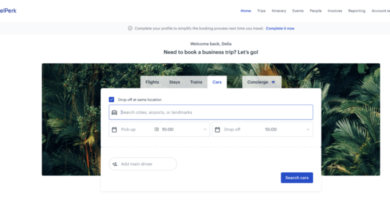Business tourism 101: All you need to know
Despite its drastic decline during the pandemic, business tourism is on track to recover and continues to be a significant contributor to the global travel industry.
As Covid-related travel restrictions started easing, international tourism nearly tripled in January to July 2022, compared to the same period in 2021, according to the United Nations World Tourism Organization (UNWTO).
Corporate travel, which is an important part of international tourism, is expected to reach a global market value of $2 trillion by 2028, or nearly three times its 2020 levels.
This isn’t surprising, given the extraordinary ROI of business travel: for every $1 a company spends on travel arrangements, they get back $12.5 in revenue.
But what is business tourism exactly? What makes it so important? And what types of business tourism are there?
In this article, we’ll look at the answers to these questions – and more.
What is business tourism?
Business tourism simply means traveling for business purposes, domestically or internationally. It’s one of the main types of tourism and a major contributor to global economic growth and knowledge exchange.
Employees and executives travel for work for a number of reasons:
- To participate in internal meetings at different office locations
- To meet business partners (clients or suppliers)
- To go to conferences, exhibitions, trade shows, and other local or international business events
- To take part in company retreats or incentive trips
In all those instances, business tourism enables you to open new channels of communication, exchange information in a more efficient way, and work better with others.
Is business tourism always strictly work-related, though?
The short answer is no. Although business trips used to be very short and purpose-oriented, more and more travelers are now combining business and leisure tourism in what is now known as “Bleisure”.
And indeed, in 2017, more than 60% of business trips included leisure activities, be it staying a few days longer at the destination, going to a museum or a concert, or exploring the local cuisine.
Why is business tourism important?
So, what makes business tourism so important, even in the digital age?
The answer is simple: Nothing beats face-to-face communication when it comes to connecting with others and building trust. And we all know how important trust is in developing strong business partnerships.
Sharing the same physical space enables people to connect in a more direct and immediate way than when using Zoom and Google Meet. This, in turn, helps them to:
- Better understand common goals, needs, and challenges
- Work together more efficiently
- Easily share knowledge and ideas
- Achieve important breakthroughs and solve problems faster
And indeed, business travel is still an essential part of doing business, even in the age of remote work – 60% of employees say the best way to learn on the job is to be around colleagues, according to our own survey with 1000 US workers.
Business travel helps employees be more productive, too: More than half of 16-24-year-olds say they have the best business ideas while traveling. Others said, younger generations find it particularly inspiring to travel for work!
In addition to that, 43% of all workers feel less stressed while on a business trip rather than while working from home or from the office (compared to only 25% who feel more stressed). B2B marketers find live events to be very impactful when it comes to demand generation, too: 68% say that events are the most effective tactic for capturing new leads.
So, business tourism is here to stay – and its economic impact continues to be significant.
See how to save money on business travel
What are the different types of business tourism?
Business travelers have different goals and motivations when traveling. This means that there are a few distinct types of business travel that the tourism industry needs to cater to:
Traditional business traveling
In this type of business travel, employees and execs go from one place to another to meet with each other or with their partners and clients.
This enables them to work together, collect important information and insights, explore and develop new strategies, and share knowledge effectively.
Typical business tourism activities include organizing and attending presentations, meetings, formal dinners, and more.
Incentive trips
Some companies use all-expenses-paid vacations, known as incentive trips, to reward top-performing employees or establish better relationships with their most important clients.
Such initiatives can help improve employee motivation and customer loyalty. Leisure travel activities (rather than formal business meetings) are usually the most important part of incentive trips.
Conference and exhibitions
Conferences, exhibitions, congresses, trade shows, and other events enable companies to gain exposure to new markets at scale – and meet many new prospective partners and clients in a matter of hours or days.
These are proving even more popular with 2023 already looking busy for event organizers and companies making plans on the top conferences to attend.
Many travel management companies such as TravelPerk offer an Events Management service to make things easier and streamline everything from booking accommodation and transport to managing attendees and sharing trip details with them. This helps make sure everyone is having a great travel experience.
How has business tourism evolved over the years?
Business tourism has been around for a while: After all, international trade trips in the past were also a form of business tourism!
Fast forward to the 21st century, and for a long time, business trips were booked by working with a traditional brick-and-mortar travel agency or contacting the airline company directly.
In more recent years, online bookings and specialized travel agencies have simplified corporate travel significantly. That said, many companies find managing business travel an overwhelming task. Especially when they’re using multiple websites to search for the best deals, having to book each element of the trip with different providers, and trying to keep track of multiple invoices and payments.
This is where a modern business travel management platform like TravelPerk can help simplify the life of admin staff, travel managers, and business travelers. TravelPerk enables you to plan, manage, and track bookings and expenses from one single online tool and make sure all aspects of your employees’ future trips are taken care of.
Download TravelPerk’s Ultimate guide to travel management to find out how you can optimize business tourism management at your company, helping you to save time and money.




